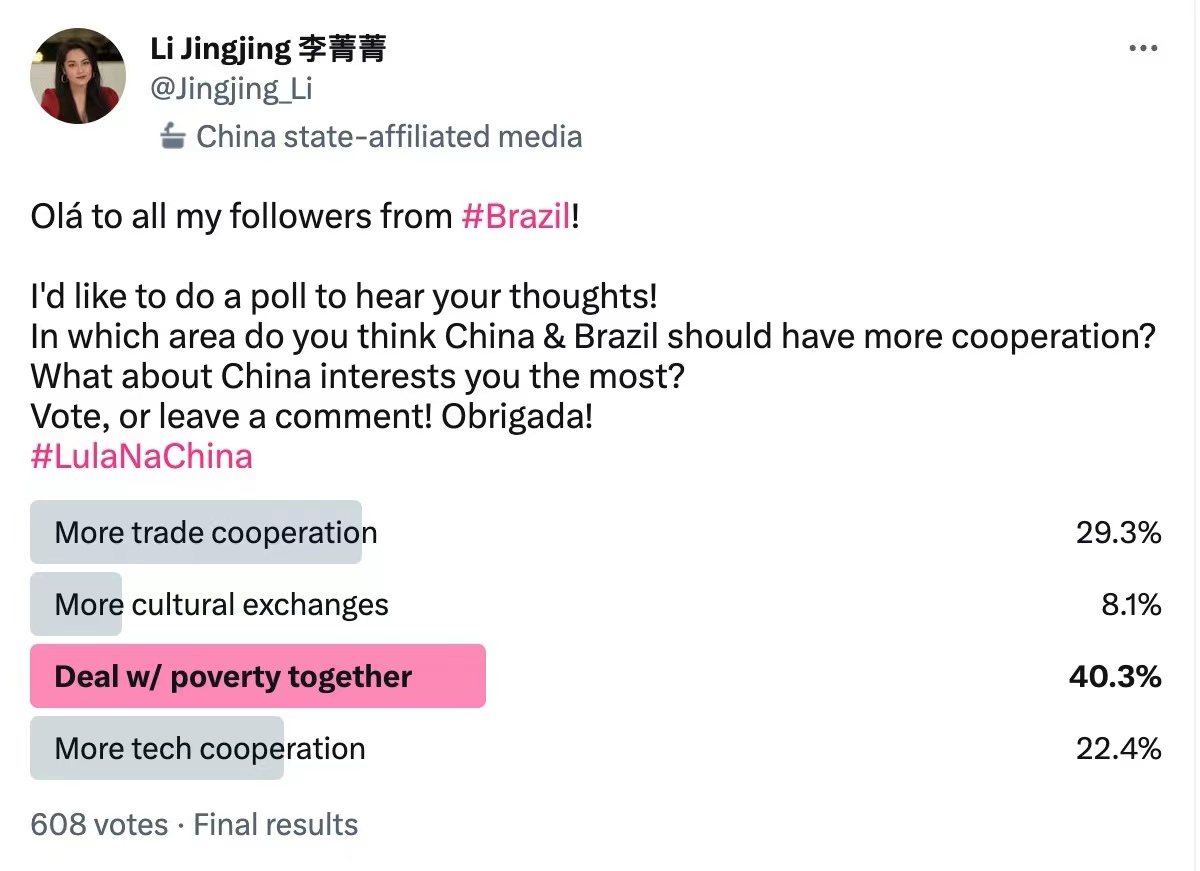In big cities of China, there's a growing presence of and enthusiasm for Latin culture, be it food, music, dance, art or language. Yet, most are from the Spanish-speaking countries in the Americas.
Places or events for the majority of people in China to really experience and learn about Brazilian culture are still very limited.
As the presidents of China and Brazil met in Beijing this week, the two BRICS countries are embarking on a new journey of deeper bilateral relations.
The two countries have been each other's leading trading partners for decades. The two heads of state signed a wide range of bilateral cooperation documents, such as in trade, investment, digital economy, science and technology innovation, information and communications, and poverty reduction.
But to further bring the people of the two countries closer, more cultural communication and people-to-people exchanges are still much needed.
Lacking cultural exchanges
"Soft power," as we know, is important to connect people. To deepen the connections between China and Brazil, more cultural exchanges, such as sports, arts, language and academic exchanges, are needed for people from both countries to gain a much better understanding of each other.
"There's a huge gap, but there are also lots of similarities between Brazilian culture and Chinese culture," Vinicius Batista de Oliveira from Sao Paulo, who has been studying and working in China for 10 years, said in an interview with CGTN.
02:48

He is among the many people who are trying to bridge the gap between China and Brazil, with their extensive understanding of both cultures. He gained his bachelor's and master's degree in universities in China and founded the Hainan Foreseekers Technology Company, trying to bring China's technology and the trendy "live commerce" model back to Brazil.
He noticed that in Brazil, most people's understanding of current China is still very limited, or even negative, and that's why he's trying to create more China-related content on his platform to keep people updated.
In China, people's knowledge about Brazil is more or less in a similar situation, but there's a gradual change.
"Every time when I say I'm a Brazilian, especially a few years ago, people's first reaction would be, wow, football! Neymar!" Oliveira said. "But this perspective is changing. When I say I'm a Brazilian now, people want to talk about politics and economy."
In a poll conducted on the writer's Twitter account aiming to gather opinions from Brazilian users, 608 people in total cast their votes. Among them, 40.3 percent voted they hope China and Brazil will have more cooperation on poverty reduction; 29.3 percent voted for more trade cooperation, and 22.4 percent voted for more tech cooperation, with only 8.1 percent voting for cultural exchanges.

Screenshot of the poll on CGTN reporter Li Jingjing's Twitter account./CGTN Photo
Screenshot of the poll on CGTN reporter Li Jingjing's Twitter account./CGTN Photo
Such preference is understandable considering 33 million Brazilians fell back into hunger during the last administration and 120 million still suffer from different types of food insecurity. Collaborating on tech and trade and adopting some of China's experience of eradicating absolute poverty will help the Brazilian people to overcome these domestic issues.
Marco Fernandes, a Beijing-based Brazilian researcher with the Tricontinental: Institute for Social Research, believes that cooperation with China is fundamentally different from cooperation with other Western countries, because it empowers Latin American countries with investment and technology, which will help them stand on their own feet. He believes this development is the opposite of what neo-liberalism and colonialism have done to Latin America.
03:06

"We need alternatives and guess who is the main driver of the creation of alternatives right now? It's China," Fernandes said.
He believes that the time has come for Brazil to send its students and officials to China, so that they can get firsthand experience of the China model of modernization and propose countless forms of cooperation between the two countries, just like hundreds of Chinese engineers, researchers and government officials visited Brazil in the 1980s to learn about Brazil's industrial development and adapt it to Chinese needs.
People also shared their interest in knowing each other beyond just the economic level.

A Twitter user says in the comment section of the poll that he wishes to see more courses on Chinese language and culture in universities outside of China. /CGTN Photo
A Twitter user says in the comment section of the poll that he wishes to see more courses on Chinese language and culture in universities outside of China. /CGTN Photo
This interest also expands to sports. One user named Emanuel proposed an interesting idea about how China and Brazil can boost each other's sports in the comment section.
The physical distance between China and Brazil may be great, but with more effort, the feelings of friendship and understanding between the people of the countries can be strengthened.